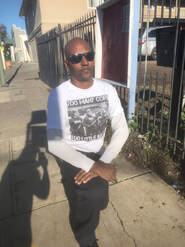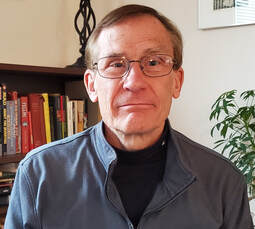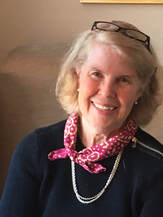|
A brief statement by Mr. Allen follows each poem OUR DAILY CURSE Give us this day Our daily curse Which impacted our kin, Seventeen of us youth, Our elders, including our two dear Eldest females under one roof-- Give us this day Our daily curse Which presented us w/ Almost emptied shelves, Cupboard & refrigerator nearly clear, Our meals reduced to mustard sandwiches-- Give us this day Our daily curse Which forced us to contend for space With colonies of roaches & the occasional rat, Two or three in a bed against evening cold, Waiting for warmth, conditions like that-- Give us this day Our daily curse Which robbed us of necessary Charmin© rolls on the toilet, had us reaching For newspaper for wiping, deprivation Was the norm in my 7-yr.old life-- Give us this day Our daily curse Conclusive proof That the god we prayed to nightly Was so sadistic, they abandoned Black folks to suffer slowly from Our daily curse. My early childhood remembrances of dealing with hunger & poverty at the same time. At my old house (and it was a big one), as quick as my aunts, uncle, grandmother and great-grandmother would bring food, beverages and sundry items home, they'd be gone within days. We'd run out of food, toilet paper, you name it. This feast-and-famine cycle happened a lot, especially with kids to feed and raise. FEED This ain’t no charity. This is a protest. Supermarkets, hotels, Eateries, coffeeshops, Make waste out of fresh & prepared Food, tonnes, at day’s end. This ain’t no church function. This is a protest. Bullets, assault rifles, tanks, Aeroplanes, destroyer ships, bombs Make far-away lands killing fields. National budget spent mostly on this, forget homes. This ain’t no city programme. This is a protest. Hunger tends to exist In the First World, too. So food is recovered From rotting as waste. This ain’t no welfare line. This is a protest. Ongoing against military build-up, Gearing up for war, nights and days Dining from empty plates, drinking from empty cups, Sleeping on empty bellies, dreaming of a decent meal. Revolution sometimes begins from The bottom of a bowl. Public space gets reclaimed. That space becomes inclusive. Fresh, prepared, free Vegetarian food is shared with neighbours. Afterwards, workers & poor alike leave The corner with fuller bellies. Hunger is much worse on the streets. So some do what class society fails to do: Feed the people. Food to every fork. This ain’t no charity. This is a protest. My salute to the work of international hunger relief collective Food Not Bombs. I used to work with the San Francisco and East Bay chapters. They were the one social justice group I knew of that connected hunger with poverty, food-wasting and the federal government's national defense budget. They were saying, through their actions, "Feed the people, not the war machine. BARREN Barren Streets—Oakland’s 74 miles closed To cars—Mayor Schaaf prioritises Two-wheeled exercise and safety For gentrifiers. Barren Subway stations—Social Distancing maintained To the extreme. Underground Solid concrete ghost town. Barren Hotel rooms—They’d make better Shelter in place for the homeless than being Warehoused in close quarters on mats. Existing method: Good way to get infected. Barren Shelves—Inside the supermarket-- The spirit of hoarding Cleared them of supplies. Long line of humanity outside are in for a nasty surprise. Barren Heart—There’s Nothing left dwelling within the husk for some. Nothing left but hostility—Blame for sickness Lands on descendants of Asia. Barren Describes this reality, re-configured By rapid infection—Humanity homebound-- There’s no reverting back To normal after this. I survived Ten presidents, the residual terror of four Foreign wars, power outages, outbursts of nature, A petrol shortage, evictions and homelessness. I will survive this, even as this contaminated air World quickly goes Barren. Personal observations/feelings on how the Coronavirus pandemic changed the Bay Area, Oakland and San Francisco. WOULD YOU? Would you… Bite into a watermelon without seeds? Munch into an ear of corn without taste? Suckle the bittersweet juice from a pomegranate the size of a baby’s skull? Would you… Chew on a tomato grown with fish genes? Eat bread made with wheat that can withstand heavy clouds of insecticide mist? Cook a meal with spicy chili peppers that can make their own pesticide? A loaded gun is no longer required To play Russian Roulette with your own body. The game can now be played much slower When feasting on the cisgenic harvest. Keeping hunger away Original intent Perhaps an excuse by scientists. The poor are left to take that gamble. White rats in a cage took a chance On a potato they were fed for dinner. Liver failure Weakened immunity Are what they’d gotten in return. Will these be the effects That mistakes of science Corruptions of nature Have on us? A loaded gun is no longer required To play Russian Roulette with your own body. The game can be played much slower When feasting on the cisgenic harvest. I wouldn’t take such a chance. Would you? W: 9.6.13 [ For Miguel Robles, Rachel Parent and Tami Canal. ] [ From the new book Elohi Unitsi: Poems [ 2013 -2018 ], Conviction 2 Change Publishing, 2020. ] A statement against the genetic modification of food. A few documentaries, including one produced by the University of New Mexico, inspired this poem. In this audio recording Dee Allen is reading his poem "BARREN":  Dee Allen is an African-Italian performance poet based in Oakland, California. He’s been active on the creative writing & Spoken Word scene since the early 1990s. He is author of five books (Boneyard, Unwritten Law, Stormwater and Skeletal Black, all from POOR Press, and his newest, Elohi Unitsi*) and 24 anthology appearances including Your Golden Sun Still Shines, Rise, Extreme, The Land Lives Forever and Civil Liberties United, edited by Shizué Seigel. *TSALAGI (Cherokee): “Mother Earth.” Pronounced: Ell-oh-ee Oo-nee-chee
1 Comment
Prayers in Need The prayers of missing meals grow cold on the backroom tables of the poor, down the long hall of broken promises. The prayers of mothers fall on vines of famished words. So few are the ways to tell a child—there’s not enough. The prayers of empty bowls and the prayers of useless spoons clatter in closets of want. In silent kitchens, the prayers of being heard simmer as they wait for answers. Tonight, in the skies above the twinkling cities of the satisfied, the prayers of those in need wither before they reach the stars. Click on the button below to listen to Henry Crawford reading his poem  Henry Crawford is a Maryland poet and the author of two poetry collections, American Software (2017) and the Binary Planet (2020). Question And if we know that there is food for all-- and many out of work are starving now-- why do the powerful disregard the call? The hungry wait in line, standing tall. Some leave empty-handed—why and how? Of course, we all know there is food for all. It’s said that it will worsen by the fall-- no flour, meat, no creamy milk of cow. See how the powerful disregard the call. The farmers find no market for their haul, and so they hide their crops beneath the plow. The powerful know it could be food for all. Where’s the people’s aid in protocol? Destructive like the trash from an ocean scow. And the powerful disregard the call. The hungry infants cry. The world has stalled. Sweat does not collect on many worker’s brow. And if we know there’s food out there for all, why do the powerful disregard the call?
 Anne Harding Woodworth is the author of six books of poetry, with a seventh, Trouble, coming out in late 2020. Her poetry, essays, and reviews are published in journals in the U.S. and abroad, in print and on line. She lives in Washington, D.C., where she is a member of the Poetry Board at the Folger Shakespeare Library. |
Now more than everThese poems have been submitted to the call for poetry "Now more than ever" Archives
October 2021
Poets
All
|
||||||||
 RSS Feed
RSS Feed